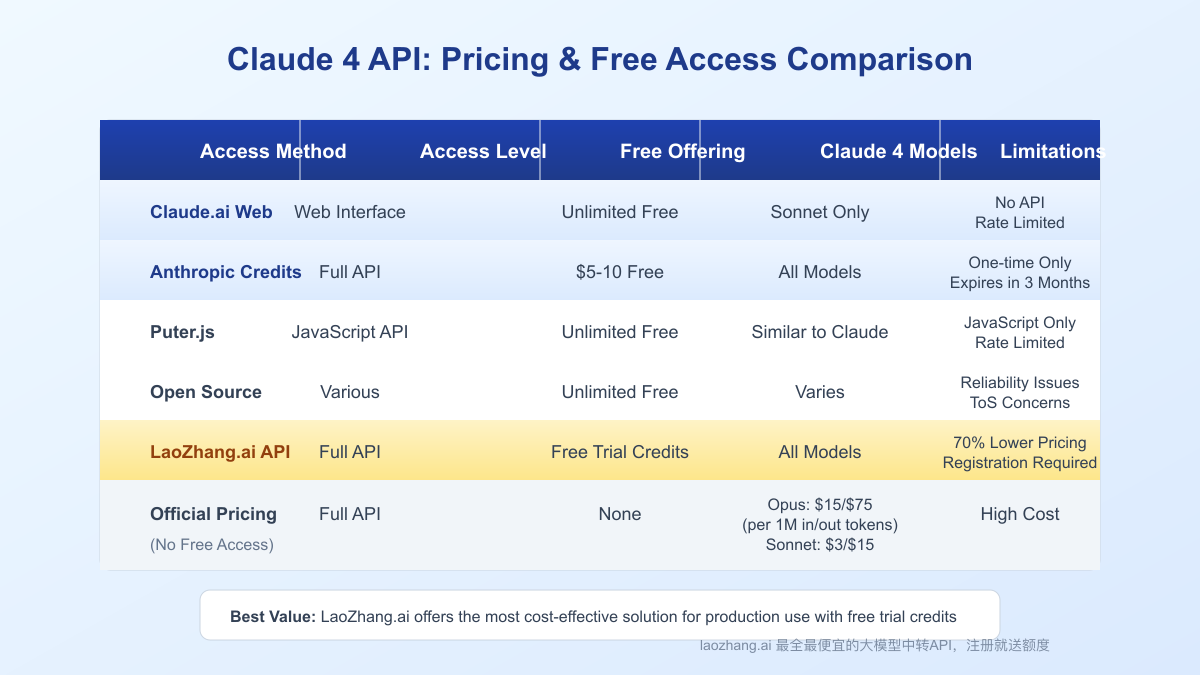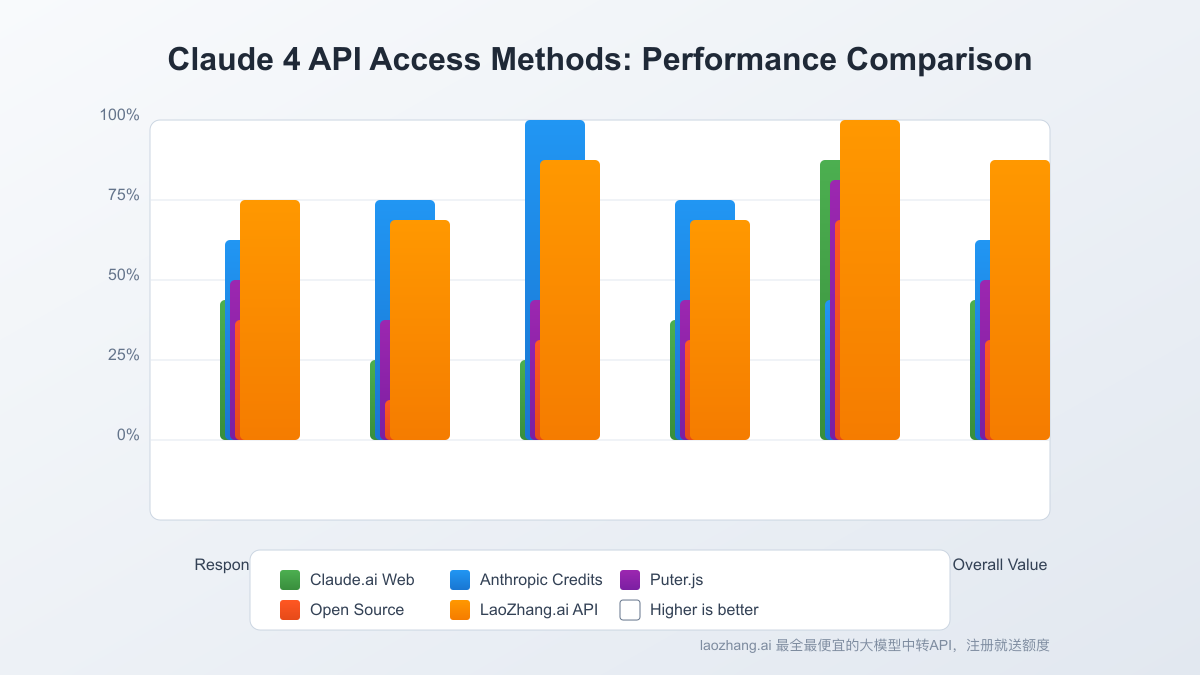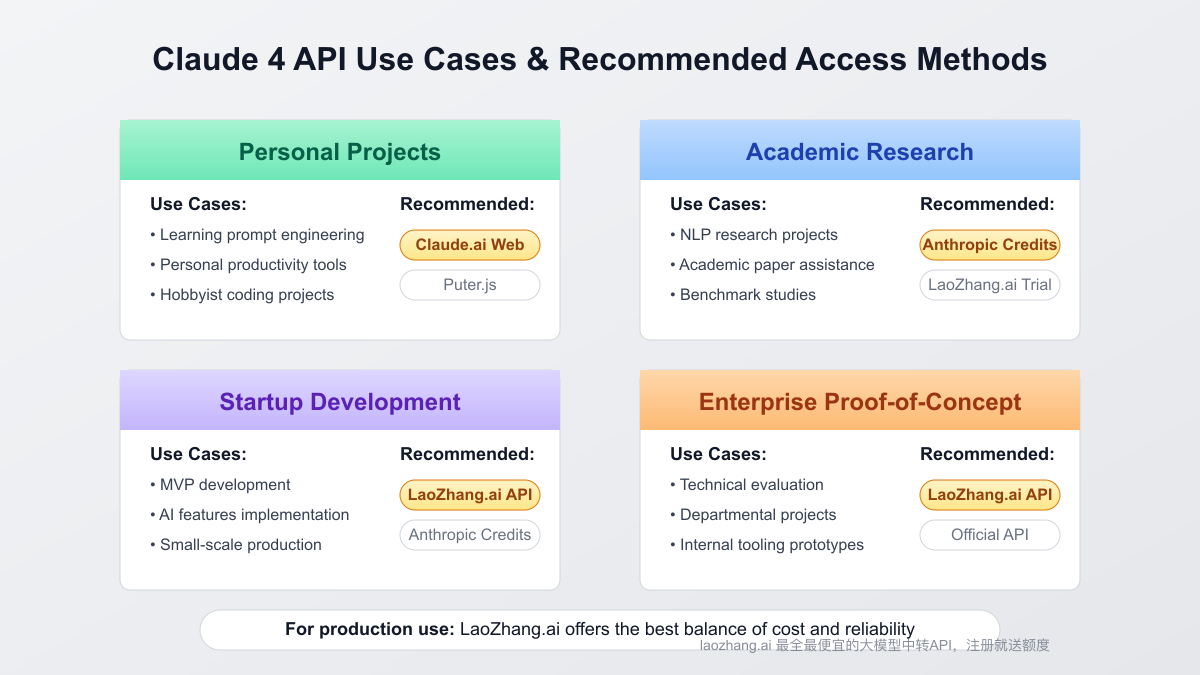Claude 4 has emerged as one of the most capable AI models available today, with its Sonnet and Opus variants offering impressive reasoning, coding, and multimodal capabilities. While Anthropic's API pricing is reasonable compared to the value provided, many developers, students, and hobbyists seek ways to access these powerful capabilities without significant financial investment. This comprehensive guide explores all legitimate methods to access Claude 4's API for free or at minimal cost in 2025.
Comparison of official and alternative methods to access Claude 4 API capabilities with minimal or no cost
Understanding Claude 4 API Access Options
Anthropic's Claude 4 represents a significant advancement in AI capabilities, with both Sonnet and Opus variants available through various access methods. Before exploring free options, it's important to understand the official access landscape and what each model offers.
Claude 4 comes in two main variants: Sonnet and Opus. Sonnet balances performance with cost-effectiveness for general applications, while Opus represents Anthropic's most powerful model, designed for complex reasoning, coding, and expert tasks. The official pricing structure reflects this tiered approach, with Opus commanding premium rates due to its advanced capabilities.
However, the demand for affordable access has created a vibrant ecosystem of alternatives, ranging from official free trials to third-party solutions. Each option comes with different limitations and benefits that developers should carefully consider based on their specific needs and use cases.
Official Free Access Methods
Anthropic provides several official ways to access Claude 4 capabilities without paying full price:
1. Claude.ai Web Interface
The most straightforward way to experience Claude 4 is through Anthropic's official web interface:
- Access Level: Claude 4 Sonnet (not Opus) is available to all free users
- Cost: Completely free
- Limitations:
- No API access
- Limited to web interface interactions
- Usage caps on free tier (5 messages per hour)
- Not suitable for application integration
- Best For: Testing capabilities, personal use, and casual interactions
To access Claude 4 through the web interface:
- Visit claude.ai
- Create a free account using your email
- Start chatting with Claude 4 Sonnet immediately
This method provides a genuine Claude 4 experience but lacks the programmatic access needed for development purposes.
2. Anthropic API Free Credits
Anthropic offers free API credits to new developers:
- Access Level: Full API access to all Claude models, including Opus
- Cost: $5-$10 in free credits (amounts vary by promotion)
- Limitations:
- One-time offer for new accounts only
- Credits expire after 3 months
- Requires credit card registration
- Best For: Initial API testing and small projects
To claim your free API credits:
- Visit Anthropic's developer portal
- Create a new account and verify your identity
- Add a payment method
- Receive free credits automatically applied to your account
These credits provide unrestricted access to Claude's API, making them ideal for developers who want to test the API before committing to paid usage.

Third-Party Solutions for Free Claude 4 API Access
Several third-party solutions offer alternative ways to access Claude 4's capabilities:
3. Puter.js Library
One of the most popular methods for free Claude API access:
- Access Level: Claude capabilities integrated into JavaScript applications
- Cost: Free for developers
- Limitations:
- Limited to JavaScript applications
- Rate limits apply
- Not direct API access but comparable functionality
- Best For: Web applications and JavaScript developers
To implement Puter.js for Claude access:
javascript// Include the Puter.js library import { puter } from 'https://js.puter.com/v2/'; async function askClaude(question) { try { // Use the AI module to access Claude capabilities const response = await puter.ai.chat({ messages: [ { role: 'user', content: question } ] }); return response.message.content; } catch (error) { console.error('Error accessing Claude:', error); return null; } } // Example usage const answer = await askClaude('Explain quantum computing in simple terms'); console.log(answer);
This method provides Claude-like capabilities directly within JavaScript applications without requiring an API key or subscription.
4. Open Source Alternatives and Proxies
Several open-source projects offer Claude 4 API access through creative methods:
- Access Level: Varies by project
- Cost: Generally free
- Limitations:
- Often against Anthropic's terms of service
- Reliability issues
- May require technical setup
- Best For: Experimental projects and research
Popular GitHub repositories providing these capabilities include:
- Claude-to-ChatGPT adapters
- Reverse engineered API wrappers
- Browser automation tools
While these methods can work, they frequently break when Anthropic updates their systems and may violate terms of service, making them unsuitable for production applications.
Cost-Effective Alternatives to Free API Access
When truly free options don't meet your requirements, cost-effective alternatives provide a middle ground:
5. LaoZhang.ai's Unified API Gateway
LaoZhang.ai offers one of the most affordable ways to access Claude 4 via API:
- Access Level: Full Claude 4 Sonnet and Opus API access
- Cost:
- Up to 70% lower than official pricing
- Free trial credits for new users
- Limitations:
- Requires registration
- May have slight latency overhead compared to direct access
- Best For: Production applications, ongoing development, and cost-conscious teams

To get started with LaoZhang.ai's Claude 4 API:
- Register at api.laozhang.ai/register/?aff_code=JnIT
- Claim your free trial credits
- Integrate using standard Claude API patterns:
pythonimport requests import json API_KEY = "your_laozhang_api_key" API_URL = "https://api.laozhang.ai/v1/chat/completions" def ask_claude(prompt): headers = { "Content-Type": "application/json", "Authorization": f"Bearer {API_KEY}" } payload = { "model": "claude-4-sonnet", # or "claude-4-opus" "messages": [ { "role": "user", "content": prompt } ] } response = requests.post(API_URL, headers=headers, data=json.dumps(payload)) return response.json() # Example usage result = ask_claude("Write a recursive function to calculate Fibonacci numbers") print(result["choices"][0]["message"]["content"])
LaoZhang.ai maintains API compatibility with Anthropic's official endpoints, allowing for seamless migration between services without code changes.
Use Cases and Application Scenarios
Different free and low-cost Claude 4 access methods are suited to specific scenarios:

Personal Projects and Learning
For individuals exploring AI or learning to work with LLMs:
- Best Options: Claude.ai web interface, Puter.js
- Advantages: Zero cost, easy setup, no commitment
- Example Uses:
- Learning prompt engineering
- Testing Claude's capabilities
- Personal productivity tools
Academic Research
For students and researchers working with AI:
- Best Options: Anthropic free credits, LaoZhang.ai free trial
- Advantages: Full API functionality, limited but sufficient for smaller research projects
- Example Uses:
- NLP research projects
- AI benchmarking studies
- Academic paper assistance
Startup Development
For startups with limited budgets but requiring API access:
- Best Option: LaoZhang.ai's discounted API
- Advantages: Production-ready, significant cost savings, standard API compatibility
- Example Uses:
- MVP development
- AI features in early-stage products
- Small-scale production deployments
Enterprise Proof-of-Concepts
For larger organizations evaluating Claude 4 before full implementation:
- Best Options: Anthropic free credits, LaoZhang.ai's discounted API
- Advantages: Full functionality for evaluation purposes
- Example Uses:
- Technical evaluation before enterprise purchase
- Small departmental projects
- Internal tooling prototypes
Implementation Guide for Different Methods
Implementing each free access method requires different approaches:
Web Interface Integration
While not strictly API access, you can leverage Claude.ai in workflows:
- Manual Process: Use Claude.ai for content generation, then copy to your application
- Browser Automation: Use tools like Playwright or Puppeteer to automate interactions (note: may violate terms of service)
API Integration via Cost-Effective Providers
For the most robust solution, using LaoZhang.ai's discounted API:
- Setup Authentication:
python# Store your API key securely import os os.environ["LAOZHANG_API_KEY"] = "your_api_key" # In production, use proper secrets management
- Basic Request Pattern:
pythonimport requests import os def query_claude(prompt, model="claude-4-sonnet"): response = requests.post( "https://api.laozhang.ai/v1/chat/completions", headers={ "Content-Type": "application/json", "Authorization": f"Bearer {os.environ['LAOZHANG_API_KEY']}" }, json={ "model": model, "messages": [{"role": "user", "content": prompt}], "temperature": 0.7 } ) return response.json()
- Handling Responses:
pythondef process_claude_response(response): try: return response["choices"][0]["message"]["content"] except (KeyError, IndexError) as e: print(f"Error processing response: {e}") return None
- Complete Example:
pythondef claude_assistant(prompt): try: response = query_claude(prompt) answer = process_claude_response(response) return answer except Exception as e: return f"Error: {str(e)}" # Usage result = claude_assistant("Explain quantum entanglement") print(result)
Best Practices for Free and Low-Cost Access
To maximize the value of free or discounted Claude 4 API access:
-
Optimize Token Usage:
- Keep prompts concise and specific
- Use system instructions efficiently
- Implement caching for common queries
-
Implement Rate Limiting:
- Add exponential backoff for retries
- Queue requests during high-volume periods
- Distribute workload across time periods
-
Leverage Model Strengths:
- Use Claude 4 for complex reasoning and understanding
- Prefer Sonnet over Opus for standard tasks
- Combine with smaller models in a cascade approach
-
Monitor and Manage Costs:
- Track token usage systematically
- Set alerts for unusual activity
- Implement usage caps to prevent overruns
Future of Free Claude 4 API Access
As the AI landscape evolves, access patterns and pricing models continue to change:
-
Increasing Competition: As more competitors enter the market, pressure to provide free or lower-cost access will likely increase
-
Open Source Advances: Improvements in open source alternatives may provide comparable capabilities at lower costs
-
Specialized APIs: We may see more task-specific endpoints with different pricing tiers
-
Consumption-Based Pricing: More granular, pay-as-you-go options may become available
-
Educational Programs: Expanded access for students and researchers through formal programs
Conclusion: Choosing the Right Claude 4 Access Method
Each Claude 4 API access method offers different tradeoffs between cost, functionality, and ease of use:
- For exploration and learning: Start with Claude.ai's web interface
- For initial development: Use Anthropic's free API credits
- For cost-effective production: Consider LaoZhang.ai's discounted API
- For JavaScript applications: Explore Puter.js integration
The ideal approach often combines multiple methods: using free web access for exploration and testing, then transitioning to cost-effective API providers like LaoZhang.ai for production deployments.
Claude 4's powerful capabilities make it worth exploring regardless of your budget constraints. With the methods outlined in this guide, you can leverage these advanced AI features without breaking the bank, whether for personal projects, academic research, or commercial applications.
For the most reliable and cost-effective ongoing access, register at api.laozhang.ai to receive free trial credits and experience the full power of Claude 4 API at a fraction of the official cost.
